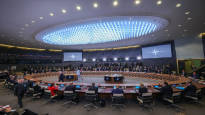BRUSSELS Russia’s war of aggression against Ukraine has occupied NATO’s attention for 600 days. Now crises are bubbling up in different directions around Europe.
The defense ministers of the NATO countries gathered in Brussels, under the pressure of the crises, reflected on the situational picture and what is the relationship of the crises to each other.
– Everything is connected to everything, Finland participated in its first NATO ministerial meeting Antti Häkkänen (total) your sum.
The attack on Israel by the Palestinian extremist organization Hamas is a war that may reach or be reflected on a wider scale.
The situation of Kosovo in the Balkans is escalating. NATO is increasing its peacekeepers in the region.
Azerbaijan took over the Armenian-administered Nagorno-Karabakh, and the people of the region had to flee to Armenia. The situation speaks of instability in the former Soviet republics. France has promised to supply arms to Armenia.
Drone debris has already fallen into Romania twice from the Ukrainian side. Casualties and near misses increase the risk of war spreading.
In the shadow of these crises there are smaller problems: someone or something damaged the gas pipeline and communication cable between Finland and Estonia.
Sweden’s membership in NATO is still in the Turkish president’s pocket. General Secretary Jens Stoltenberg told the meeting today that he spoke directly to the representative of Turkey so that the country would fulfill its promise and accept Sweden’s membership.
Crises in the local environment affect NATO at least indirectly.
Israel’s important ally is NATO’s largest country, the United States, which is ready to support Israel. It has brought an aircraft carrier and fighter jets to the stations, which it will use if necessary to support Israel.
Britain also announced that it will send patrol and surveillance aircraft, two naval ships and marines to the eastern Mediterranean to support Israel.
NATO countries strongly condemn the attack by Hamas and state that Israel has the right to defend itself. The countries are showing their solidarity with Israel, but it is not yet clear whether the country also hopes for other forms of support.
NATO countries also reminded that civilians should not suffer, and Israel’s response must be proportionate. What that means remains to be seen and interpreted.
One factor is interesting NATO is also in pressing crises, and that is Russia’s role.
Russia invaded Ukraine and occupied Crimea in February 2023, and there is no solution to the war. Ukraine’s counter-offensive has not progressed so that any breakthrough is about to happen. The war is becoming long and consuming, which turns it in Russia’s favor. Ukraine remains in existence only with the military and financial aid of the West.
In the Middle East, Russia is benefiting from the attack by Hamas, which weakens Israel. It is also an ally of Iran, which is close to Hamas.
Russia is also a country that would not mind shaking societies with hybrid attacks.
About the wars between Israel and Ukraine both can become crises that drain the West’s resources. There are also fears that the war in Ukraine will be forgotten or that there will not be enough help because ammunition is needed for Israel.
However, wars are not zero-sum games, and it is not necessarily about the exact same need for support and armament. United States Secretary of Defense Lloyd Austin promised in Brussels that support will continue both to Ukraine and Israel.
The president of Ukraine who visited the NATO meeting Volodymyr Zelenskyi positions Ukraine empathetically. He hoped that the NATO countries would support the people of Israel, who have been subjected to the atrocities of Hamas.
– Terrorists do not change. They have to lose and that means we have to win.
NATO surrounded by crises trying to promote stability around them. At the very least, its task is to guarantee peace and credible defense to its member countries.
In their meetings in Brussels, the defense ministers promoted NATO’s own defense, which was jointly decided to strengthen at the July meeting in Vilnius. So that NATO’s army does not exist only on paper, NATO is for the first time creating a readiness to mobilize a certain number of troops in a certain time. This strengthens NATO’s deterrence.
The last lock of deterrence is nuclear weapons, the operation of which NATO practices once a year. This year’s training is next week in Italy, Croatia and the Mediterranean.
You can discuss the topic on 13.10. until 11 p.m.
